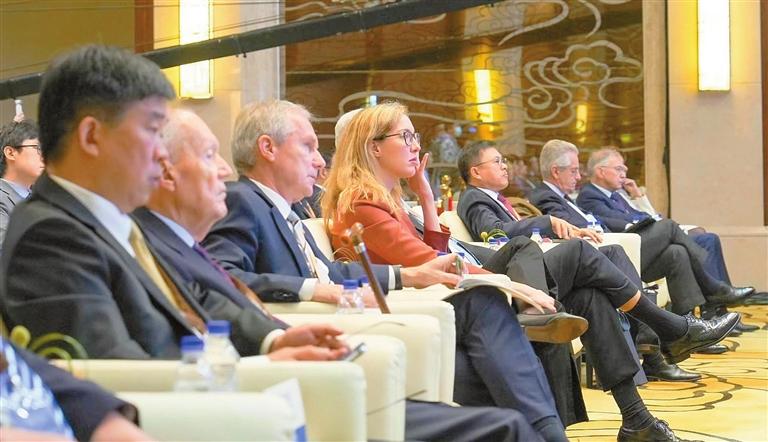
Chen Siqi vankochensq@163.com OVER 130 political, academic and business figures representing more than 40 countries and regions have gathered for the ongoing 2023 Imperial Springs International Forum in Guangzhou. President Xi Jinping sent a congratulatory letter to the forum yesterday, when the opening ceremony was held. This year marks the eighth edition of the forum, which started Sunday and lasts three days until today. It is themed “Multilateralism: More Exchanges, Greater Inclusiveness and Cooperation.” The agenda includes plenary discussions and six breakout sessions, focusing on seven key topics such as global strategic stability, economic recovery, global cooperation, climate change and the Belt and Road Initiative (BRI). At yesterday’s opening ceremony, Danilo Türk, former president of Slovenia and president of World Leadership Alliance-Club de Madrid, said cooperation based on the principles of mutual respect and mutual advantage is crucial for the world’s economic future and international stability and security. “Now, this forum will provide us with an insight into China’s approaches and best practices, and share with the rest of the world in this environment,” Türk said. Vaira Vike-Freiberga, former president of Latvia and co-chair of the Nizami Ganjavi International Center, highlighted China as a concrete example of multilateralism, especially citing BRI as a significant pillar of China’s foreign policy. While acknowledging the initiative as a win-win project, Vike-Freiberga suggested an evaluation of its 10-year progress to identify areas for improvement. The idea of BRI was further explained by Zheng Yongnian, director of the Institute for International Affairs of Qianhai at The Chinese University of Hong Kong, Shenzhen. He said BRI embodies China’s practice of multilateralism, demonstrating inclusiveness in action. “Why is it named the Belt and Road Initiative? The word ‘initiative’ indicates that it was proposed by us and our partners to address issues collectively,” Zheng said. He also highlighted the leading role of the Guangdong-Hong Kong-Macao Greater Bay Area (GBA) in BRI drive due to its substantial economy. “It’s very important for us coming from outside to understand that China is a huge country, and there are differences also inside China,” Esko Aho, former prime minister of Finland, said in an interview. “Different provinces, different regions do play a different role. The GBA provides us a lot of opportunities to conduct trade, to achieve common economic development.” Luc Pontet, dean of Brest Business School in France, appreciated collaboration, a keyword of the conference. “It’s very important that people who have the power to decide to create collaboration among people from all over the world,” he told Shenzhen Daily. Global collaboration is also important for students, and the exposure to different cultures is necessary for them to foster ideas and common goals, he noted. Since the forum was initiated in 2014, it aims to facilitate substantive discussions on subjects encompassing world peace, economic development and cultural exchanges, thereby fostering enhanced understanding and consensus among participants to promote regional and global cooperation. | 
